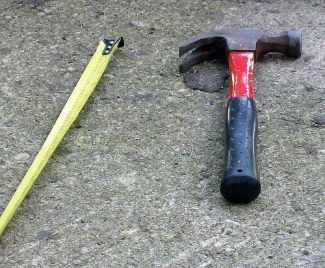Tips on Hiring a Contractor
Hiring the right contractor for a construction project can be surprisingly difficult. Since your choice of contractor will directly impact your satisfaction with the completed project, it is important to be as thorough as possible in your search process.
Figure Out What You Want

While your project is still in the planning stage, before speaking to contractors, take the time to map out what you want to accomplish, in as much detail as you can. This will make your discussions with contractors much easier and help avoid misunderstandings down the road.
Figure out things like: your budget for the project, the material type and quality you want to use, and the completion time you need. As you do your research, consult designers, architects, and material suppliers, as needed, so that you understand your options and preferences.
Due Diligence
After your planning is done and you begin your search for a contractor, take the time to conduct thorough due diligence. This becomes especially important for larger jobs.
Compile a large list of possible contractors, and then work to narrow it down to at least 3 candidates to request bids from. During your research, be sure to use your friends and acquaintances as resources, since word of mouth is often a good way to find candidates.
 As you research the contractors on your list, try to get a feel for how reputable and established they are. Do an online search. Read reviews that are available, and also look for any complaints (search contractor names along with words like "review" or "complaint").
As you research the contractors on your list, try to get a feel for how reputable and established they are. Do an online search. Read reviews that are available, and also look for any complaints (search contractor names along with words like "review" or "complaint").
Check with the Better Business Bureau. Find out what information they have on the contractors. Have any complaints been lodged? If so, what was done to address them?
Find out whether the contractors are licensed in your location, and do not hesitate to confirm this by calling the licensing organization.
Additionally, check to make sure they have the proper liability insurance. Get written proof of insurance, as this is often required to obtain a building permit. Take the extra step of calling their insurance agent, to make sure the policy is current and in force. While you are on the phone, ask the agent whether the policy has consistently been in place or if it has frequently lapsed or been cancelled.
Finally, get multiple references from those contractors that you seriously consider. Call each one and find out if the project was completed to their satisfaction. Did the contractor stay within budget and finish on time? If problems came up, how were they handled? Was there any damage done to the property? If possible, go take a look at the contractor's work for yourself.
Discussions with Contractors
 Sit down and talk at length with the contractors on your short list. Ask a lot of questions. Find out about their experience. How long have they been in business? What type and scale of project do they typically take on? What do they consider to be their specialty?
Sit down and talk at length with the contractors on your short list. Ask a lot of questions. Find out about their experience. How long have they been in business? What type and scale of project do they typically take on? What do they consider to be their specialty?
As you discuss your project, keep in mind that a good contractor will have a wealth of experience and can provide you with a lot of helpful advice. It is unlikely that they will simply agree with all your ideas about the best way to handle the project. Actually, if they do, it could be a warning sign - that they are simply trying to sign you up as a customer without helping you consider the best, most feasible ways to accomplish your project.
Finally, find out how busy they are, and whether they have the capacity for additional work. If it sounds like they already have too much on their plate, be careful. On the other hand, if they seem to have no work at all, that could be a warning sign too.
Bids
In order to gain negotiating power and the ability to compare, solicit bids from at least 3 contractors. Get the bids in writing, and make sure they address specific detail. You will want to be able to make "apples to apples" comparisons across the bids you receive. To accomplish this, be as specific as possible about the scope of the project when requesting bids, so that all the contractors bid on similar work, time-frame, and material quality.
Keep in mind that simply choosing the lowest bidder is not necessarily the best course of action. There could be a good reason that they seem so cheap. Find the reasons for any major price differences in the quotes you receive. Be cautious if a particular bidder uses extremely low estimates for materials or labor. Find out why.
Be sure to take intangible factors into account as well. Interpersonal interaction, for example, can be extremely important. You will need to get along with the contractor and work with them to make decisions and handle problems that come up. If your personalities conflict badly, the project will suffer.
Get Everything in Writing
 Before the contractor starts work, sign a written contract that clearly lays out all important details. Of course, the contract should include major elements like: the exact scope of the work to be performed, expected time line, types of materials to be used, contractor's responsibilities, budget, and schedule of payment.
Before the contractor starts work, sign a written contract that clearly lays out all important details. Of course, the contract should include major elements like: the exact scope of the work to be performed, expected time line, types of materials to be used, contractor's responsibilities, budget, and schedule of payment.
Beyond these basics, however, there are many additional details that should be agreed upon. The contract should also include things like: who is responsible for trash and materials removal (including proper removal of hazardous materials), how to handle bathroom facilities, what happens if the project goes over budget, how to resolve disputes, who will handle permits and inspections, what responsibilities the homeowner has, and the names of any subcontractors. Also, make sure the contract is clear on what happens if an outside event, like a storm or material shortage, disturbs the project's completion.
There likely will be many additional details that you will want to include in your contract as well. Make sure that there are no grey areas. In fact, if it seems like a contractor is trying to be vague, you probably do not want to work with them anyway.
It is a good idea to have a lawyer review the contract before you sign. Read it thoroughly yourself as well, since you need to fully understand what the contract contains before you finalize anything.
Worth the Effort
Although the contractor search process can require some work on your end, it is worth the effort. By taking the time to hire a contractor you are comfortable with and confident in, you greatly reduce the likelihood of ending up dissatisfied once your project is complete.
Image source: nicgep114
 The Tips on Hiring a Contractor by Water Damage Defense, is licensed under a Creative Commons Attribution-ShareAlike 3.0 Unported License.
The Tips on Hiring a Contractor by Water Damage Defense, is licensed under a Creative Commons Attribution-ShareAlike 3.0 Unported License.
This Water Damage Defense article is intended to provide information of general interest to the public and is not intended to offer legal advice about specific situations or problems. You should consult a lawyer if you have a legal matter requiring attention.
